Hongyu Zang
LongCat-Flash-Thinking-2601 Technical Report
Jan 23, 2026Abstract:We introduce LongCat-Flash-Thinking-2601, a 560-billion-parameter open-source Mixture-of-Experts (MoE) reasoning model with superior agentic reasoning capability. LongCat-Flash-Thinking-2601 achieves state-of-the-art performance among open-source models on a wide range of agentic benchmarks, including agentic search, agentic tool use, and tool-integrated reasoning. Beyond benchmark performance, the model demonstrates strong generalization to complex tool interactions and robust behavior under noisy real-world environments. Its advanced capability stems from a unified training framework that combines domain-parallel expert training with subsequent fusion, together with an end-to-end co-design of data construction, environments, algorithms, and infrastructure spanning from pre-training to post-training. In particular, the model's strong generalization capability in complex tool-use are driven by our in-depth exploration of environment scaling and principled task construction. To optimize long-tailed, skewed generation and multi-turn agentic interactions, and to enable stable training across over 10,000 environments spanning more than 20 domains, we systematically extend our asynchronous reinforcement learning framework, DORA, for stable and efficient large-scale multi-environment training. Furthermore, recognizing that real-world tasks are inherently noisy, we conduct a systematic analysis and decomposition of real-world noise patterns, and design targeted training procedures to explicitly incorporate such imperfections into the training process, resulting in improved robustness for real-world applications. To further enhance performance on complex reasoning tasks, we introduce a Heavy Thinking mode that enables effective test-time scaling by jointly expanding reasoning depth and width through intensive parallel thinking.
Fine-tuning Done Right in Model Editing
Sep 26, 2025
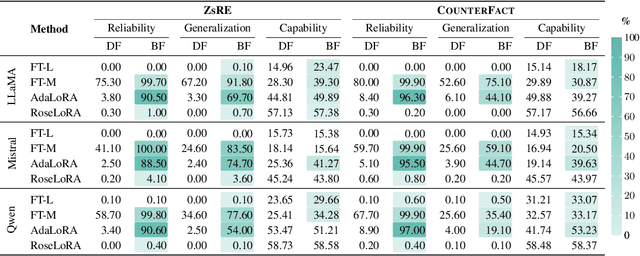
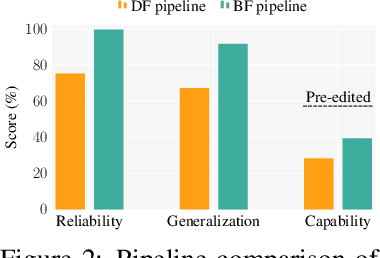
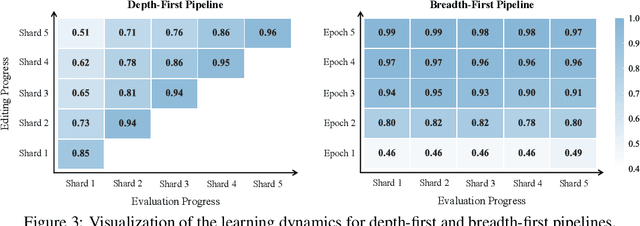
Abstract:Fine-tuning, a foundational method for adapting large language models, has long been considered ineffective for model editing. Here, we challenge this belief, arguing that the reported failure arises not from the inherent limitation of fine-tuning itself, but from adapting it to the sequential nature of the editing task, a single-pass depth-first pipeline that optimizes each sample to convergence before moving on. While intuitive, this depth-first pipeline coupled with sample-wise updating over-optimizes each edit and induces interference across edits. Our controlled experiments reveal that simply restoring fine-tuning to the standard breadth-first (i.e., epoch-based) pipeline with mini-batch optimization substantially improves its effectiveness for model editing. Moreover, fine-tuning in editing also suffers from suboptimal tuning parameter locations inherited from prior methods. Through systematic analysis of tuning locations, we derive LocFT-BF, a simple and effective localized editing method built on the restored fine-tuning framework. Extensive experiments across diverse LLMs and datasets demonstrate that LocFT-BF outperforms state-of-the-art methods by large margins. Notably, to our knowledge, it is the first to sustain 100K edits and 72B-parameter models,10 x beyond prior practice, without sacrificing general capabilities. By clarifying a long-standing misconception and introducing a principled localized tuning strategy, we advance fine-tuning from an underestimated baseline to a leading method for model editing, establishing a solid foundation for future research.
Learning Fused State Representations for Control from Multi-View Observations
Feb 03, 2025



Abstract:Multi-View Reinforcement Learning (MVRL) seeks to provide agents with multi-view observations, enabling them to perceive environment with greater effectiveness and precision. Recent advancements in MVRL focus on extracting latent representations from multiview observations and leveraging them in control tasks. However, it is not straightforward to learn compact and task-relevant representations, particularly in the presence of redundancy, distracting information, or missing views. In this paper, we propose Multi-view Fusion State for Control (MFSC), firstly incorporating bisimulation metric learning into MVRL to learn task-relevant representations. Furthermore, we propose a multiview-based mask and latent reconstruction auxiliary task that exploits shared information across views and improves MFSC's robustness in missing views by introducing a mask token. Extensive experimental results demonstrate that our method outperforms existing approaches in MVRL tasks. Even in more realistic scenarios with interference or missing views, MFSC consistently maintains high performance.
Learning Latent Dynamic Robust Representations for World Models
May 10, 2024Abstract:Visual Model-Based Reinforcement Learning (MBRL) promises to encapsulate agent's knowledge about the underlying dynamics of the environment, enabling learning a world model as a useful planner. However, top MBRL agents such as Dreamer often struggle with visual pixel-based inputs in the presence of exogenous or irrelevant noise in the observation space, due to failure to capture task-specific features while filtering out irrelevant spatio-temporal details. To tackle this problem, we apply a spatio-temporal masking strategy, a bisimulation principle, combined with latent reconstruction, to capture endogenous task-specific aspects of the environment for world models, effectively eliminating non-essential information. Joint training of representations, dynamics, and policy often leads to instabilities. To further address this issue, we develop a Hybrid Recurrent State-Space Model (HRSSM) structure, enhancing state representation robustness for effective policy learning. Our empirical evaluation demonstrates significant performance improvements over existing methods in a range of visually complex control tasks such as Maniskill \cite{gu2023maniskill2} with exogenous distractors from the Matterport environment. Our code is avaliable at https://github.com/bit1029public/HRSSM.
Towards Control-Centric Representations in Reinforcement Learning from Images
Oct 27, 2023



Abstract:Image-based Reinforcement Learning is a practical yet challenging task. A major hurdle lies in extracting control-centric representations while disregarding irrelevant information. While approaches that follow the bisimulation principle exhibit the potential in learning state representations to address this issue, they still grapple with the limited expressive capacity of latent dynamics and the inadaptability to sparse reward environments. To address these limitations, we introduce ReBis, which aims to capture control-centric information by integrating reward-free control information alongside reward-specific knowledge. ReBis utilizes a transformer architecture to implicitly model the dynamics and incorporates block-wise masking to eliminate spatiotemporal redundancy. Moreover, ReBis combines bisimulation-based loss with asymmetric reconstruction loss to prevent feature collapse in environments with sparse rewards. Empirical studies on two large benchmarks, including Atari games and DeepMind Control Suit, demonstrate that ReBis has superior performance compared to existing methods, proving its effectiveness.
Understanding and Addressing the Pitfalls of Bisimulation-based Representations in Offline Reinforcement Learning
Oct 26, 2023

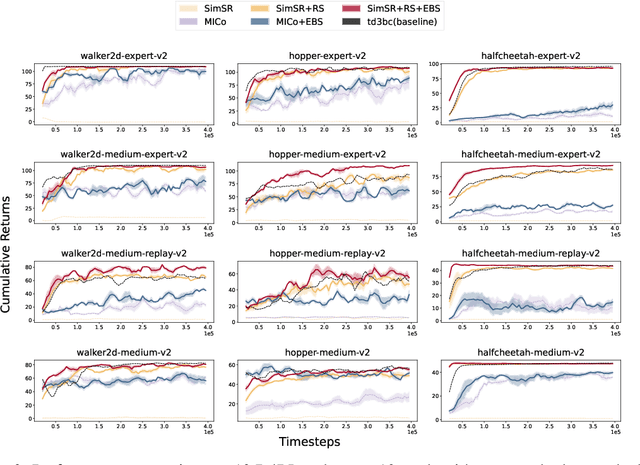
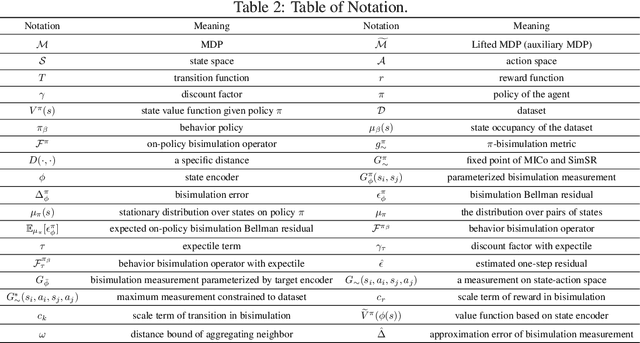
Abstract:While bisimulation-based approaches hold promise for learning robust state representations for Reinforcement Learning (RL) tasks, their efficacy in offline RL tasks has not been up to par. In some instances, their performance has even significantly underperformed alternative methods. We aim to understand why bisimulation methods succeed in online settings, but falter in offline tasks. Our analysis reveals that missing transitions in the dataset are particularly harmful to the bisimulation principle, leading to ineffective estimation. We also shed light on the critical role of reward scaling in bounding the scale of bisimulation measurements and of the value error they induce. Based on these findings, we propose to apply the expectile operator for representation learning to our offline RL setting, which helps to prevent overfitting to incomplete data. Meanwhile, by introducing an appropriate reward scaling strategy, we avoid the risk of feature collapse in representation space. We implement these recommendations on two state-of-the-art bisimulation-based algorithms, MICo and SimSR, and demonstrate performance gains on two benchmark suites: D4RL and Visual D4RL. Codes are provided at \url{https://github.com/zanghyu/Offline_Bisimulation}.
Representation Learning in Deep RL via Discrete Information Bottleneck
Dec 28, 2022


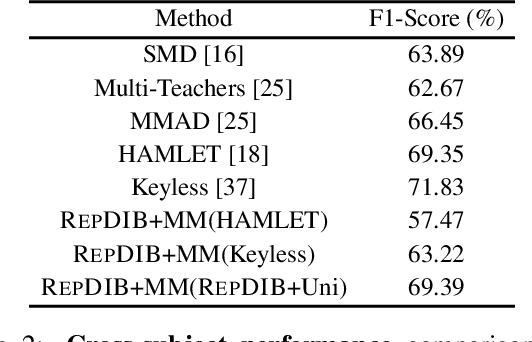
Abstract:Several self-supervised representation learning methods have been proposed for reinforcement learning (RL) with rich observations. For real-world applications of RL, recovering underlying latent states is crucial, particularly when sensory inputs contain irrelevant and exogenous information. In this work, we study how information bottlenecks can be used to construct latent states efficiently in the presence of task-irrelevant information. We propose architectures that utilize variational and discrete information bottlenecks, coined as RepDIB, to learn structured factorized representations. Exploiting the expressiveness bought by factorized representations, we introduce a simple, yet effective, bottleneck that can be integrated with any existing self-supervised objective for RL. We demonstrate this across several online and offline RL benchmarks, along with a real robot arm task, where we find that compressed representations with RepDIB can lead to strong performance improvements, as the learned bottlenecks help predict only the relevant state while ignoring irrelevant information.
Behavior Prior Representation learning for Offline Reinforcement Learning
Nov 02, 2022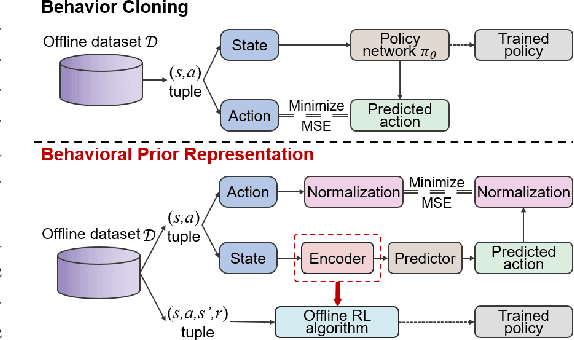

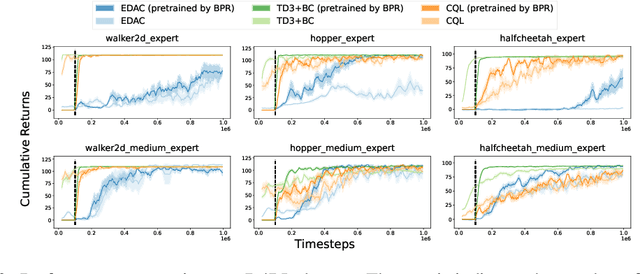

Abstract:Offline reinforcement learning (RL) struggles in environments with rich and noisy inputs, where the agent only has access to a fixed dataset without environment interactions. Past works have proposed common workarounds based on the pre-training of state representations, followed by policy training. In this work, we introduce a simple, yet effective approach for learning state representations. Our method, Behavior Prior Representation (BPR), learns state representations with an easy-to-integrate objective based on behavior cloning of the dataset: we first learn a state representation by mimicking actions from the dataset, and then train a policy on top of the fixed representation, using any off-the-shelf Offline RL algorithm. Theoretically, we prove that BPR carries out performance guarantees when integrated into algorithms that have either policy improvement guarantees (conservative algorithms) or produce lower bounds of the policy values (pessimistic algorithms). Empirically, we show that BPR combined with existing state-of-the-art Offline RL algorithms leads to significant improvements across several offline control benchmarks.
Discrete Factorial Representations as an Abstraction for Goal Conditioned Reinforcement Learning
Nov 01, 2022Abstract:Goal-conditioned reinforcement learning (RL) is a promising direction for training agents that are capable of solving multiple tasks and reach a diverse set of objectives. How to \textit{specify} and \textit{ground} these goals in such a way that we can both reliably reach goals during training as well as generalize to new goals during evaluation remains an open area of research. Defining goals in the space of noisy and high-dimensional sensory inputs poses a challenge for training goal-conditioned agents, or even for generalization to novel goals. We propose to address this by learning factorial representations of goals and processing the resulting representation via a discretization bottleneck, for coarser goal specification, through an approach we call DGRL. We show that applying a discretizing bottleneck can improve performance in goal-conditioned RL setups, by experimentally evaluating this method on tasks ranging from maze environments to complex robotic navigation and manipulation. Additionally, we prove a theorem lower-bounding the expected return on out-of-distribution goals, while still allowing for specifying goals with expressive combinatorial structure.
Agent-Controller Representations: Principled Offline RL with Rich Exogenous Information
Oct 31, 2022Abstract:Learning to control an agent from data collected offline in a rich pixel-based visual observation space is vital for real-world applications of reinforcement learning (RL). A major challenge in this setting is the presence of input information that is hard to model and irrelevant to controlling the agent. This problem has been approached by the theoretical RL community through the lens of exogenous information, i.e, any control-irrelevant information contained in observations. For example, a robot navigating in busy streets needs to ignore irrelevant information, such as other people walking in the background, textures of objects, or birds in the sky. In this paper, we focus on the setting with visually detailed exogenous information, and introduce new offline RL benchmarks offering the ability to study this problem. We find that contemporary representation learning techniques can fail on datasets where the noise is a complex and time dependent process, which is prevalent in practical applications. To address these, we propose to use multi-step inverse models, which have seen a great deal of interest in the RL theory community, to learn Agent-Controller Representations for Offline-RL (ACRO). Despite being simple and requiring no reward, we show theoretically and empirically that the representation created by this objective greatly outperforms baselines.
 Add to Chrome
Add to Chrome Add to Firefox
Add to Firefox Add to Edge
Add to Edge